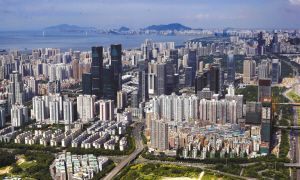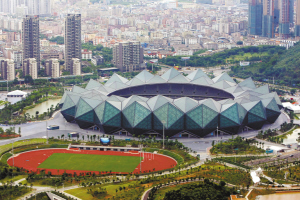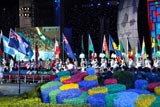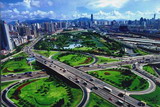Universiade makes city better
Updated: 2011-08-11 17:01
By Gao Mei (chinadaily.com.cn)
 |
|
An aerial view of Shenzhen city. [Photo/Shenzhen Special Zone Daily] |
 |
|
The Universiade Sports Center in Long Gang district, Shenzhen city, file photo. [Photo/Shenzhen Special Zone Daily] |
Throughout history, Shenzhen has been at the front of the country's "reform and opening up." In the late 1970s, the previously small fishing village became one of the most vigorous and fast-growing cities in China.
History would repeat itself again in January 2007, when Shenzhen won the bid to host the 2011 Summer Universiade.
The Games has greatly benefited Shenzhen in its infrastructure construction. The city, in the wake of 2008 Olympics host city Beijing, has built a batch of modern stadiums and new metro lines. The downtown Shenzhen has also been face-lifted, with some "urban villages" renovated.
A "Green Commuting" campaign was a great success and citizens' involvements in city governing increased.
The Universiade has played a vital role in accelerating the city's economic transformation process. Thanks to the Games, the suburban districts, which were once excluded from the SEZ (special economic zones), have joined the SEZ and benefited from the Games.
More than half of the 22 newly-built stadiums are located in these districts, along with the Universiade center, the Games Village. Streets and old stadiums have been renovated, new metro line and expressways connect these "outside-SEZ-areas" with "inside-SEZ-areas," and have brought more people to reside here.
Shenzhen has been a leader in technology innovation, home to many innovative local companies such as Huawei, ZTE, Tecent, to name just a few.
The city's unique vanguard culture has been formed in the wake of economic development. Once mocked as a "culture desert," Shenzhen is now highly credited for its openness, integrity and innovation.
As a typical immigrant city, Shenzhen seeks to build a complete social security system that benefits all its citizens, including migrant workers and disadvantaged groups. The minimum monthly wage in Shenzhen is 1,320 yuan ($206), the highest standard in China.
Health insurance system has covered 10.8 million peoplem and 8.34 million of them are migrant workers, which means Shenzhen has realized a universal coverage of its 10.35 million permanent residents in health insurance.
Green and environment-friendly approaches are utilized not only for the Games, but also for the city itself. With energy consumption for unit GDP production in Shenzhen comprising half of the national average, Shenzhen has been leading in energy saving and emission reduction in the whole country.
Now, Shenzhen will take the Universiade, which will kick off Friday in Shenzhen Bay Sports Centre, as a platform to display its 30 years of achievements to the world.
Related Stories
Shenzhen residents benefit from Universiade 2011-08-11 16:44
Shenzhen Universiade ready for unique opening ceremony 2011-08-11 14:10
Universiade boosts quality of life in Shenzhen 2011-08-10 16:03
Shenzhen warmly welcomes you 2011-08-10 13:23
'Easy Travel' network put into service in Shenzhen 2011-08-09 16:10
Shenzhen embraces 'Green Commuting' campaign 2011-08-08 14:56
Video

Working as a Universiade volunteer

Party starts as Universiade ends

Sumptuous seafood in Shenzhen

Athletes test doping knowledge
About Shenzhen

